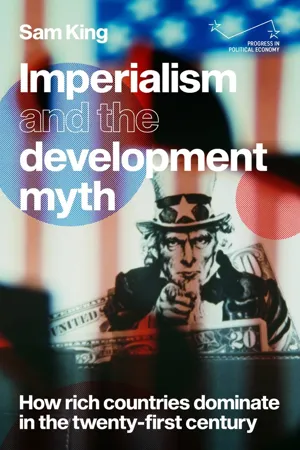
Imperialism and the development myth
How rich countries dominate in the twenty-first century
- 312 pages
- English
- ePUB (mobile friendly)
- Available on iOS & Android
Imperialism and the development myth
How rich countries dominate in the twenty-first century
About this book
China and other Third World societies cannot 'catch up' with the rich countries. The contemporary world system is permanently dominated by a small group of rich countries who maintain a vice-like grip over the key parts of the labour process – over the most technologically sophisticated and complex labour. Globalisation of production since the 1980s means much more of the world's work is now carried out in the poor countries, yet it is the rich, imperialist countries – through their domination of the labour process – that monopolise most of the benefits. Income levels in the First World remain five and ten times higher than Third World countries. The huge gulf between rich and poor worlds is getting bigger not smaller. Under capitalist imperialism, it is permanent.China has moved from being one of the poorest societies to a level now similar with other relatively developed Third World societies – like Mexico and Brazil. The dominant idea that it somehow threatens to 'catch up' economically, or overtake the rich countries paves the way for imperialist military and economic aggression against China. King's meticulous study punctures the rising-China myth. His empirical and theoretical analysis shows that, as long as the world economy continues to be run for private profit, it can no longer produce new imperialist powers. Rather it will continue to reproduce the monopoly of the same rich countries generation after generation. The giant social divide between rich and poor countries cannot be overcome.
Frequently asked questions
- Essential is ideal for learners and professionals who enjoy exploring a wide range of subjects. Access the Essential Library with 800,000+ trusted titles and best-sellers across business, personal growth, and the humanities. Includes unlimited reading time and Standard Read Aloud voice.
- Complete: Perfect for advanced learners and researchers needing full, unrestricted access. Unlock 1.4M+ books across hundreds of subjects, including academic and specialized titles. The Complete Plan also includes advanced features like Premium Read Aloud and Research Assistant.
Please note we cannot support devices running on iOS 13 and Android 7 or earlier. Learn more about using the app.
Information
First World: income above $25,000 | Second World: income $15,700–$25,000 | Third World: income below $15,700 | World | |
Number of states and territories | 32 | 14 | 148 | 194 |
Population (thousand) | 996,667 | 100,412 | 6,239,386 | 7,336,465 |
GDP (trillion) | $44.24 | $2.00 | $27.74 | $73.98 |
Share of world GDP | 59.8% | 2.7% | 37.5% | |
GDP per capita | $44,392 | $19,909 | $4,446 | $10,084 |
GDP per capita – percentage of First World average | 100% | 44.9% | 10% | 22.7% |
Share of world population | 13.6% | 1.4% | 85% |
Table of contents
- Cover
- Half Title
- Series Information
- Title Page
- Copyright Page
- Contents
- Figures
- Tables
- Foreword
- Introduction
- Part I: Two worlds
- Part II: Contemporary Marxist analysis
- Part III: Lenin’s theory of imperialism and its contemporary application
- Part IV: Monopoly and non-monopoly capital: the economic core of imperialism
- Part V: Super-exploitation of China and why catch-up is not possible
- Conclusion
- Bibliography
- Index